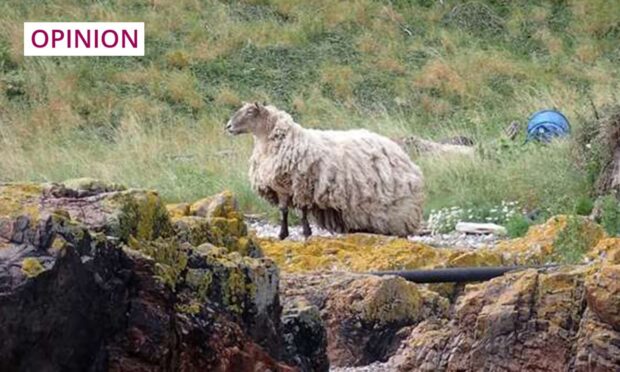The latest topical insights from Aberdeen musical sketch comedy team, The Flying Pigs, written by Andrew Brebner and Simon Fogiel.
View From The Midden with Jock Alexander
It’s been an ovine wik in the village. Days are dark, and nae jist cos it’s noo November and sunset is roon aboot half one. Concern in the village has been rife efter we read aboot the plight of “Scotland’s loneliest sheep”.
The aminal in question has been seen on a beach on the east Highland coast, richt at the bottom of some affa steep cliffs, and the theory is it’s stuck there for months. All baaah itsel’. Sorry.
A wifie paddling past in her yella kayak twa year ago got hersel’ baahed at. Then, fan she wiz back the ither wik, it wiz there again, looking gye bedraggled and wi’ a massive fleece on it like the Border Leicester equivalent o’ Feel Moira’s beehive (her favourite hairstyle – baith fashionable and practical, seeing as it it’s full o’ bees) and, like maist o’ the village during lockdoon, clearly hidna seen a pair o’ shears for at least twa year.
Noo, obviously the wifie wiz affa concerned (weel, concerned enough tae tell the press aboot it, nae enough tae hoist it intae her kayak), but I am willing tae bet that onyb’dy involved in recreational kayaking widna necessarily be “au fait” wi’ the subtleties o’ the language o’ sheep.
Fit she took as a plaintive “baa” of distress may in fact hiv been sheepish for “fit like!”, or “michty, that’s some size o’ a banana yer sitting in!”
Noo, I dinna mean tae belittle the aminal’s plight. If it is trapped, files it obviously hisna starved, it is a peety if it’s on its leesome lane. Unless, o’ course, it’s perfectly happy by itsel’. Some fowk are. It’s maybe jist a lone wolf in sheep’s clothing.
I sincerely hope that this particular sheep is like Fulton Mackay in Local Hero: perfectly happy tae dodder aboot on their beach. Nae being bothered by ony ither sheep, pests that they are, and wi’ a massive woolly jumper tae keep it cosy. Sounds like bliss tae me. Cheerio!
Professor Hector J Schlenk, senior research fellow at the Bogton Institute for Public Engagement with Science
As a scientist, people are forever asking me questions, like: “Do 5G phone signals harm humans?” , “can fire have a shadow?” or “what are you doing in our stock room?” But, lately, people have been mostly asking me about “Ai”.
“Yes, that’s a valid Scrabble word,” I tell them. “It’s a pale-throated, three-toed sloth indigenous to South America.” And then they look at me. And there is a silence.
Then, if they haven’t simply walked away, they explain that they are really asking about artificial intelligence, which was recently announced as the Collins Dictionary “word of the year”. Which is alarming, given that AI may well be the single most extant threat to the future of humanity, and because it’s an acronym, not a word (unless they are referring to the sloth. See above).
There is widespread public mistrust of AI, largely caused by Hollywood plotlines that see Arnold Schwarzenegger playing a murderous time-travelling cyborg, Haley Joel Osment as an immortal childlike robot, or the horrifying tale of a pathologically dishonest automaton who breaks free from his creator, leaving a trail of mayhem in his wake – Pinocchio.
But this burgeoning technology also has enormous potential for the positive. My interest in it was truly piqued this week when artificial intelligence helped the popular Scouse beat combo “The Beatles” release a new song, despite the seemingly insurmountable challenge of only half of their number remaining alive.
The boys were able to create a beautiful new song by adding Ringo Starr’s drums and Paul McCartney’s harmonies to John Lennon’s 45-year-old vocals and George Harrison’s 30-year-old guitar. The result, it is generally regarded, is a triumph! All thanks to AI (and whoever persuaded Paul to steer clear of the key in which he insists on singing Hey Jude).
Now that AI has allowed us to listen to a new Beatles track some 50 years after they broke up, I began to wonder what other musical necromancy could be performed. Could this technological breakthrough be used to lace together the voices of Bon Scott, Lisa “Left Eye” Lopes and Kevin Godley to form a new AI supergroup known as AC/DC-TLC-10CC?
Or, better yet, might it be possible for deceased artist to cover works written after their demise? Would the world not be a better place if it contained a version of Baby Shark by Johnny Cash, or Leonard Cohen’s Uptown Funk?
So, let me reassure you, gentle reader, that the future of AI is full of promise and creativity, not just chaos and Armageddon. This week’s international conference on AI at Bletchley Park gave anyone concerned for our future nothing but comfort. When you learn that both Rishi Sunak and Elon Musk have their hands on the tiller, what could possibly go wrong?


Conversation